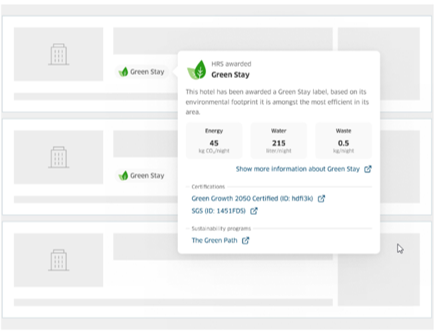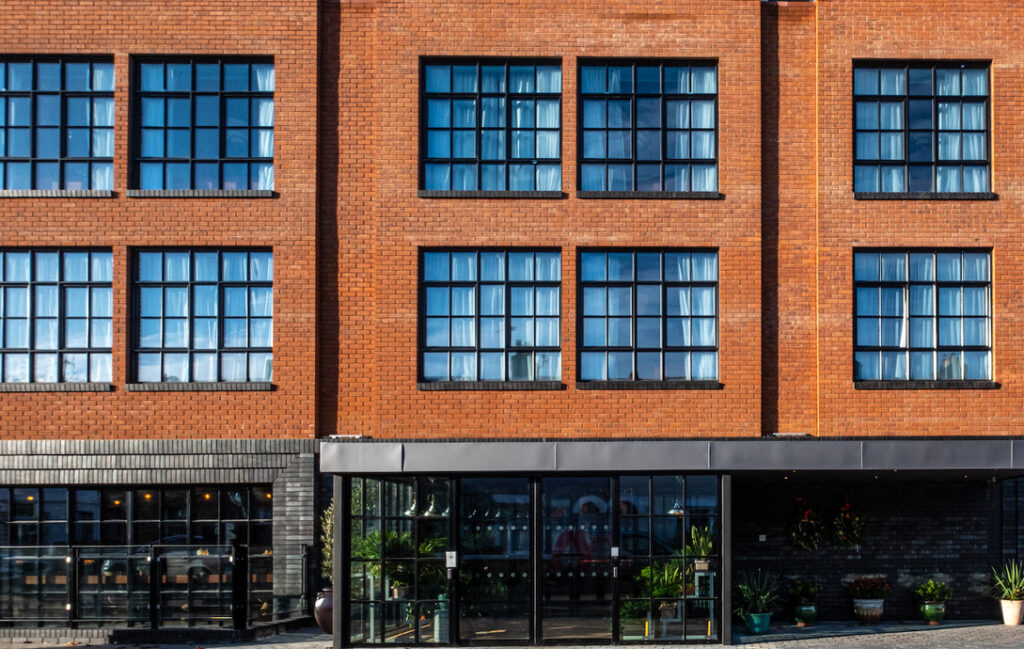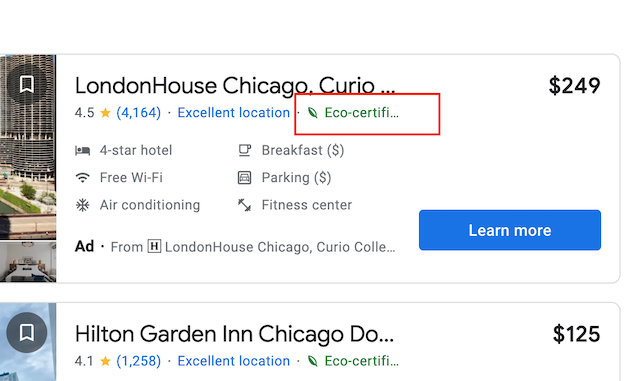
By Aaron Belton, Head of Global Hospitality at DocMX - 12.7.2022
This year’s UN Climate Conference, Cop27 took place against a backdrop of an energy crisis and confirmation that the world is not doing enough to tackle carbon emissions and protect the future of our planet.
With urgency being the buzzword from environmental experts, consumers are expecting businesses to take rapid responsibility and as importantly, share transparency around the steps they are taking.
A survey from TripAdvisor shares how tourists are already taking action themselves. 62% of travelers are opting for more environmentally friendly hotels, food, and transportation and 69% said they intended to make even more environmentally responsible travel choices in the future.
So what does this mean for hotels and hospitality? What can our industry do to help the global goal of achieving net zero targets by 2050 and a maximum 1.5⁰C in global temperature rises?
At DocMX, we’re helping hundreds of hotels across the world make an easy change from paper data & records to digital transformation. Our technology helps reduce the environmental impact of deforestation, whilst at the same time optimizing efficiency and removing slow, stressful and outdated operational procedures.
As fans of smart innovation, we’ve gathered some of the best practice examples in sustainability from hotels across the world. We’re here to celebrate the change-makers in a mission to inspire others to follow similar steps.
1. A paper-free future
Perhaps one of the easiest adaptations that hotels can make is to reduce their reliance on paper records and embrace digital. Hundreds of our own customers including Hilton, Marriott, Kimpton and Holiday Inn have replaced outdated paper and printing based systems with DocMX solutions to reduce the cost and increase the efficiency of hotel operations.

Paper making accelerates deforestation which impacts global warming. Trees slow the rate of global warming by providing oxygen, improving air quality, reducing wind speeds, cooling air, water conservation, soil preservation and supporting wildlife.
We’ve calculated that for an average 300-room hotel, our digital solutions help save several thousand copies of paper reservations, invoices and purchase orders each month. In fact, our client IHG Hotels in Asia discovered that by not printing 180,000 sheets of paper they saved 22 trees, 2300 hours and 10 cents for every sheet not printed!
What’s more, moving to a paperless future is sustainable and helps hotels perform well against ESG criteria as well as customer expectations. In a recent survey from the World Economic Forum, over 80% of global consumers say that they favor sustainable business and this affects where they spend their money.
2. Eradicating Emissions
Increasingly hotels are implementing new technologies to achieve sustainable eco-friendly practices in their operations. These range from reduced energy consumption and food waste to eco-friendly construction materials.
In March 2021, a new Green Stay Initiative was launched by HRS with the goal of providing a transparent platform for hotels to share performance metrics on energy, water and waste, while also enabling corporations to steer bookings to hotels aligned with their carbon-related goals.
 In their own words, this initiative provides full data transparency with recommendations to enable more sustainable business travel and accommodation. The measurement and evaluation system uses an algorithm approved by United Nations and Greenhouse Gas Protocol.
In their own words, this initiative provides full data transparency with recommendations to enable more sustainable business travel and accommodation. The measurement and evaluation system uses an algorithm approved by United Nations and Greenhouse Gas Protocol.
Accor was the first global hospitality group to join the Green Stay Initiative and shortly afterwards, Marriott announced plans to participate as part of a commitment to reach net-zero emissions.
“The world’s leading multi-national companies are promoting their aspirations to achieve net-zero operations by 2030 or sooner. These company-wide goals impact managed travel programs, who are tasked to travel more sustainably as they recover from the pandemic,” says HRS CEO Tobias Ragge.
Marriott International has also signed up to Race to Zero – a global campaign rallying companies, cities, regions, financial and educational institutions to reach net-zero emissions by no later than 2050. Participants are committed to an overarching goal of reducing emissions across all aspects of their business with transparent action plans and robust short-term targets.
But tackling climate change is more than signing global pledges committed to future outcomes. It’s about specific actions undertaken by individual hotels that empowers employees and community in the present day.
 As early as 2018 Hilton launched its own commitment to redefine sustainable travel through their Travel with Purpose 2030 Goals, which align with the United Nation’s Sustainable Development Goals. Hilton measures their performance through LightStay, their award-winning ESG management platform. LightStay allows Hilton to measure, manage and report environmental and social impact across their global portfolio of more than 6,800 managed and franchised hotels.
As early as 2018 Hilton launched its own commitment to redefine sustainable travel through their Travel with Purpose 2030 Goals, which align with the United Nation’s Sustainable Development Goals. Hilton measures their performance through LightStay, their award-winning ESG management platform. LightStay allows Hilton to measure, manage and report environmental and social impact across their global portfolio of more than 6,800 managed and franchised hotels.
Marriott International, the largest hotel chain in the world, has its own Sustainability and Social Impact Goals called Serve360. It means that all their hotels are individually working to reduce overall carbon footprint by 50% with a deadline of 2025.
Initiatives include increased use of renewable energy, a reduction in food waste and single use plastics, continued modifications to design standards so buildings are more efficient, and the installation of automation systems and energy efficiency upgrades such as smart temperature regulation.
“This rigorous climate commitment to reach net-zero emissions is a needed step for us to do our part to help the communities and environments where we live, work and visit remain resilient and vibrant,” said Anthony Capuano, Chief Executive Officer, Marriott International.
3. Building impact
The most efficient way to implement best practice in climate cooling is before a first brick is laid – at the very outset of hotel building and impact planning. Independent hotels and hospitality companies are pioneering impressive change and rapidly embracing sustainability in their hotel design, construction materials and architecture.

A recent example is room2, the world’s first net zero carbon hotel opened by The Lamington Group in London last year. Expected to be 89% more energy efficient than the typical UK hotel, room2 Chiswick has been built with “pioneering technologies to achieve net zero throughout both the design and construction stages and throughout its whole life, which in a hotel industry first, includes both embodied and operational emissions.”
Room2 converts 100% of its energy needs for heating, cooling and hot water. Two ‘lab rooms’ provide data on energy, water use and air quality, along with studying and learning from guest behaviors. The building has been opened up to University partnerships to test new innovative technologies and interventions to reduce energy and carbon. Learnings will be used to advance the net zero building framework for future hotels as a pioneering example for the built environment.

Located just above the Arctic Circle in Norway, @Svart is the world’s first energy-positive hotel which opened in 2021. The circular property has a 360-degree view of the Svartisen glacier, and aims to reduce its yearly energy consumption by 85% compared to other modern hotels, by using solar energy.
At the @Whitepod Eco Luxury resort in Switzerland, the dome shaped accommodation pods are highly energy efficient requiring less energy to circulate air and maintain even temperatures approximately 30% less than a conventional building.
4. Facing Down Food Waste
According to a report by the World Wildlife Fund, the hospitality industry is responsible for approximately 1.6 billion metric tons of food waste each year. In an effort to reduce this amount of waste, many hotels are already onboarding new policies and technology.
At Ibis Paris CDG airport under the leadership of Frederic Ferreira, Food & Beverage Director the F&B team has deployed numerous eco-responsible actions, from waste reduction, sorting and recycling to harvesting rainwater and eliminating single-use plastic.
The Swissôtel in Chicago, has implemented a “Food Rescue” program that donates unserved food to local charities. The program has been so successful that it has expanded to all of the Swissôtel’s North American properties.
Iberostar Group, the Spanish hospitality company, which has forty five hotels across the globe has announced that it will be installing artificial intelligence in its more than 100 hotels globally in order to become zero waste.
This commitment is thanks to an innovative system, based on technology from solution provider, Winnow Systems, which will contribute to ending food waste and bringing the company closer to its goal of being free of waste sent to landfill by 2025.
And finally, keep an eye on innovation startups like Remy Robotics. This young business is helping to eliminate both food waste and staff shortages through automating kitchen operations using AI driven robotics.
5. Positive partnerships
Sustainable responsibility cannot just lie with hotels. There is a lengthy link chain of associated suppliers and providers within the hospitality sector who need to adapt. And some are already doing just that.
Commercial flying accounts for about 3% of global emissions and passenger numbers are increasing by 5% each year. According to Leafscore, some airlines are already taking strides to shrink or offset their carbon footprint by investing in environmentally sustainable projects around the world.
Two airlines at the top of the Leafscore league table include KLM and Alaska Airlines. KLM’s Carbon Reduction Roadmap has a set goal of reducing its total carbon footprint by 15% in 2030.
KLM completed its first biofuel commercial flight in 2011 and today, the company uses 57 times more biofuel than before, seeking out ways to increase this amount. One method is building the first sustainable aviation fuel plant in the Netherlands, which will run on organic waste streams that include used cooking oil.
The airline has also launched a ‘Fly Responsibly’ campaign focused on educating its customers about some of the planet-friendly alternatives they should consider instead of taking a flight, including trains or hosting business meetings virtually. This makes KLM one of the only airlines willing to encourage potential customers not to give them business when it’s a better option for the planet.
Alaska Airlines has publicly declared a commitment to lower CO2 emissions and limit environmental damage. The airline is maximizing fuel efficiency by using split scimitar winglets that save an estimated 34,000 gallons of fuel per aircraft per year. The airline also reduced its reliance on paper products by 50%, and now composts coffee grinds from in-flight beverages, resulting in over 14 tons of composted coffee per year. The airline currently composts other food waste in 12 flight kitchens as well.
6. Share and celebrate
By sharing positive practice changes, the hotel and hospitality sector can help consumers make planet friendly choices and inspire other businesses to accelerate green behavior.
 Eco-travel buzz words are increasing in Google searches and the term “green hotel,” for instance, has quadrupled in search volume since March 2020, according to Google Trends.
Eco-travel buzz words are increasing in Google searches and the term “green hotel,” for instance, has quadrupled in search volume since March 2020, according to Google Trends.
Responding to this movement, Google has launched a new initiative enabling hotels to identify their sustainability efforts on their search results detail page alongside amenities and health and safety practices.
The pages now label hotels as “Eco-Certified” in global search results, with a leaf-shaped icon next to the hotel’s name. Clicking on the “About” tab details the property’s specific sustainability practices, such as having water use audited by an independent organization or using energy from carbon-free sources.
Many global brands have signed up to the platform and Marriott has gone further, launching a publicly available responsible sourcing guide for its supplier community to join its sustainability journey.
At DocMX, we’re proud to promote our commitment to reducing deforestation through our partnership with One Tree Planted. We have pledged to donate funds to plant trees for every new customer we sign up. We contribute to reforestation and conservation projects in different geographical areas, as close as possible to our customers’ location and our funding is used to plant trees with local communities and in the right season, as well as maintain planted saplings over several years. Find out more here.
We hope our 6 steps to sustainability guide helps many more hotels and suppliers recognize that change is possible in so many ways. By highlighting existing change-makers, we’re sharing stories of inspiration and good practice. There’s really no excuse.
 Aaron Belton is Head of Global Hospitality at DocMX. With over a decade of experience working with global hospitality brands such as Marriott, Hilton and IHG and more than 20 years of first-hand experience working hand in hand with hospitality professionals in Asia, Oceania and Europe, Aaron says his goal is to bring the latest technology to the hotel sector community. Aaron is passionate about innovation and currently leads the DocMX digital transformations team in London. They drive efficiencies and tangible savings to hotels affected by the pandemic whilst also developing “DocMX Wellness Chatbot” with leading Psychology professionals to support employees with their journey through Covid-19 recovery.
Aaron Belton is Head of Global Hospitality at DocMX. With over a decade of experience working with global hospitality brands such as Marriott, Hilton and IHG and more than 20 years of first-hand experience working hand in hand with hospitality professionals in Asia, Oceania and Europe, Aaron says his goal is to bring the latest technology to the hotel sector community. Aaron is passionate about innovation and currently leads the DocMX digital transformations team in London. They drive efficiencies and tangible savings to hotels affected by the pandemic whilst also developing “DocMX Wellness Chatbot” with leading Psychology professionals to support employees with their journey through Covid-19 recovery.
Are you an industry thought leader with a point of view on hotel technology that you would like to share with our readers? If so, we invite you to review our editorial guidelines and submit your article for publishing consideration.
